TRASHY TUESDAY: PAPERBACK FANATIC 49, WWII ASSASSINATION NOVELS, THE MARK HOOD BOOKS, RYFKA By PATRICK ALEXANDER AND THE LATEST MAQ!
The latest edition of Paperback Fanatic (No. 49) by Justin Marriott just arrived, along the new Men’s Adventure Quarterly (No. 11), and both are terrific issues!
As usual, the latest issue of Paperback Fanatic is full of fascinating articles, from the Falklands War Fiction of the 1980s and 90s, to a tribute to Robert Lory (author of the cult Dracula series), to a look at crime stories featuring mistaken identities and plastic surgery, to World World II movie and television tie-ins and Jules Burt’s feature on the collectible paperback novels of science fiction author J G Ballard.
There is a wealth of terrific material here, with my favourites being editor Justin Marriott’s look at the war novels of British thriller writer John Harris, and Steve Myall’s article on the once popular Sudden western series by Oliver Strange, which seemed to be in every newsagency I visited when I was a teenager.
As always, the high quality of the articles is matched by terrific illustrations of all the relevant covers in full colour. It is really a feast for the eyes for fans of paperback fiction, and is incredibly well priced on Amazon. It is a must read for anyone interested in vintage paperbacks or popular culture from the second half of the twentieth century.
I had the pleasure of contributing two articles to Paperback Fanatic No. 49. One is a follow-up on my earlier article on the Mark Hood spy novels by James Edmond Macdonnell for Australian publisher Horwitz. In this new article I look at the difference between the American and Australian editions of the books and hopefully clear up some misconceptions about the series.
My second article is on the rise in popularity of World War II thrillers in the 1970s and 80s following the success of Jack Higgins’ The Eagle Has Landed (1975). Higgins’ book confirmed the continuing allure of war thrillers for readers, and as a result there was a boom in thrillers about ‘events that have been kept secret for almost forty years and which can now be only disclosed in fiction.’
A lot of these books involved secret assassination missions. Suddenly there was surge in stories about German assassins seeking to kill Churchill, Roosevelt and other leading figures, while being pursued by dogged, discredited Allied desk officers and FBI agents. Stephen Hunter’s The Master Sniper and John Lee’s The Ninth Man are good examples of these type of books, while on the other hand there were tales about unsuccessful Allied missions to kill Hitler or other Nazis, such as Clive Egleton’s The October Plot. It was a fun article to write and I much appreciated the help from British thriller expert Mike Ripley in suggesting titles I had overlooked.
Much of the pleasure in writing the article came from re-reading the books from the 1970s and 80s that I had enjoyed so much at the time. My memory of many of them had slipped over the years, and it was great to be reacquainted with books by Frederick Nolan, Bob Langley, Nicholas Guild, Duncan Kyle and others. I also discovered some books that I had missed at the time, including William Copeland’s very accomplished Five Hours From Isfahan.
Another book that I had not read at the time was Patrick Alexander’s Ryfka. Alexander was a British author whose output was limited to just four thrillers. He is probably best known for his award winning Death of a Thin-Skinned Animal (1976), although his Soldier On The Other Side (1983) was also very good. Ryfka was his last novel and revolved around a secret mission to save the D-Day landings:
“A top secret order goes out from Churchill’s war room – a high-ranking RAF officer, shot down over occupied France with information about the D-Day landings, must be ‘recovered or eliminated’. And only one agent can do the job – a woman, code named Ryfka.
Passionate, deadly, unstable – for she has already suffered horrors at Nazi hands – Ryfka is parachuted into France with orders to kill …”
Ryfka is a real page turner. Alexander wastes little time in setting up the basic premise of the story, and in establishing the unstable nature of the woman known as Ryfka. From the opening pages there is plenty of action and near misses, as the Nazis try to catch Ryfka without really knowing what her mission is. There is some repetition in the middle of the book, with Ryfka narrowly avoiding being captured several times, but once she closes in on her target the story becomes more focused and quite exciting.
The plot is aided by all the usual tropes, including a particularly brutal Nazi commander who had previously captured and tortured Ryfka, tough French resistance fighters, unreliable collaborators and a good supporting cast of French women bravely doing their bit.
There is plenty of action and gunfire, and the concluding chapters are full of bloodshed, bravery, surprises and explosions. It would make a great film.
If you can track down a copy, Ryfka is well worth a read, especially if you are a fan World War II fiction from the late Twentieth Century.
Arriving alongside Paperback Fanatic is the latest edition of Men’s Adventure Quarterly. Edited by Robert Deis and Bill Cunningham, Men’s Adventure Quarterly is always a must read and this latest issue is a ripper.
The theme of the issue is UFOs and it is full of great original articles on alien abductions, cattle mutilations and government cover-ups from Men’s magazines of the 1950s and 60s, and a stack of pictures. There are also two really informative and interesting articles by paperback experts Jules Burt and Gary Lovisi on Gerry Anderson’s UFO series and Space Exploitation paperbacks, respectively.
Men’s Adventure Quarterly is always a good trip down memory lane, but I personally think that it also provides a better and more accurate insight into society and popular culture than a stack of academic articles. It is always a very good read and this issue is especially interesting and extremely well set out! Well done!

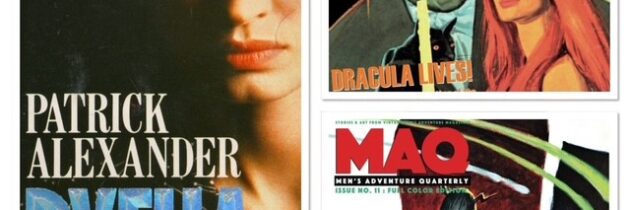
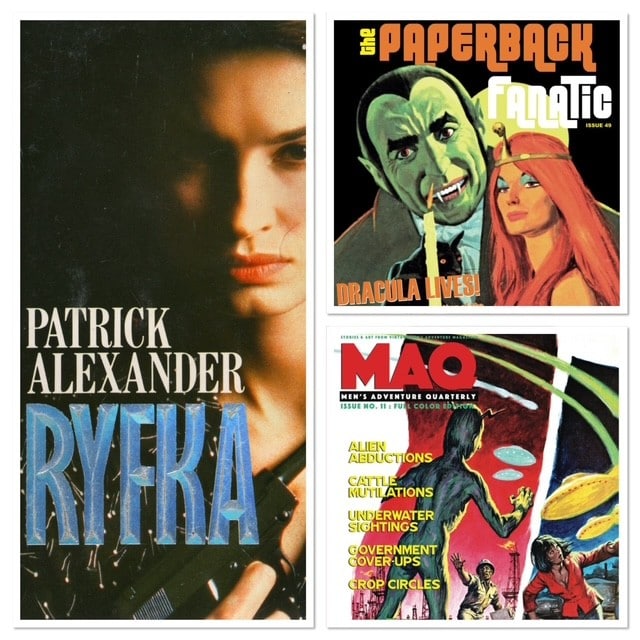
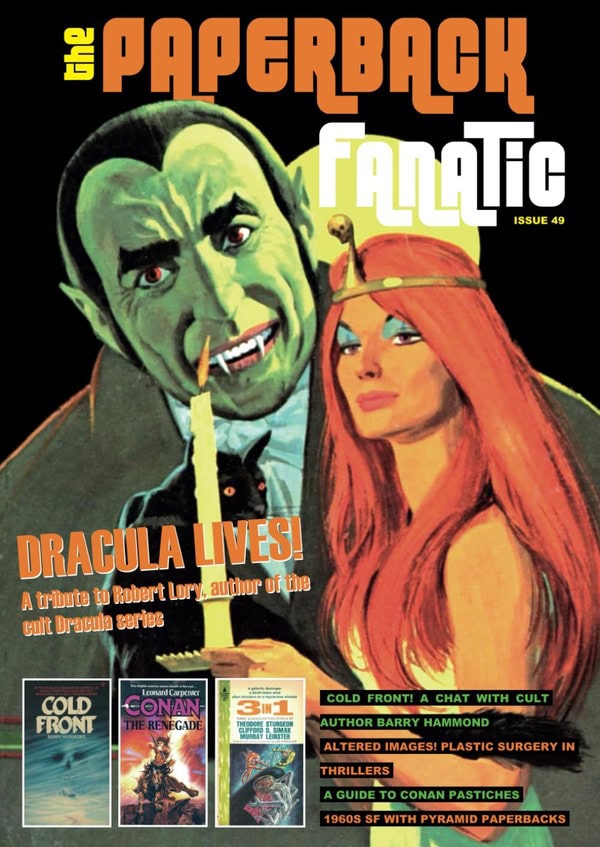
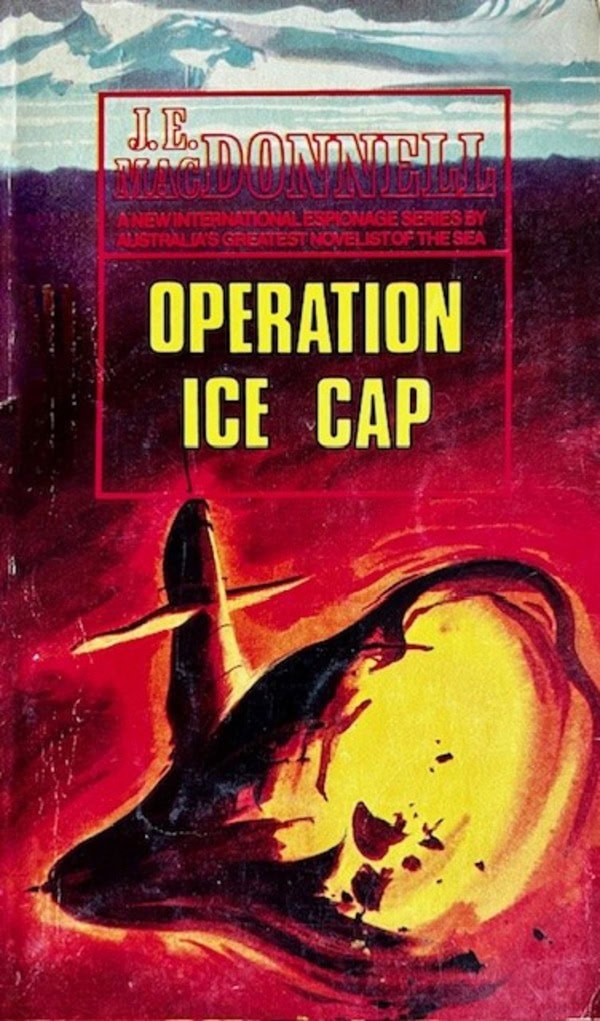
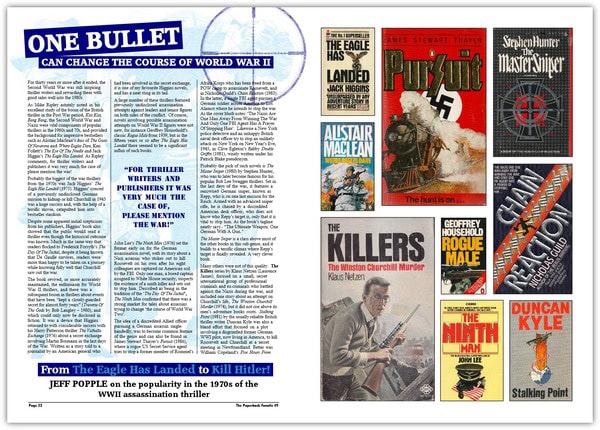

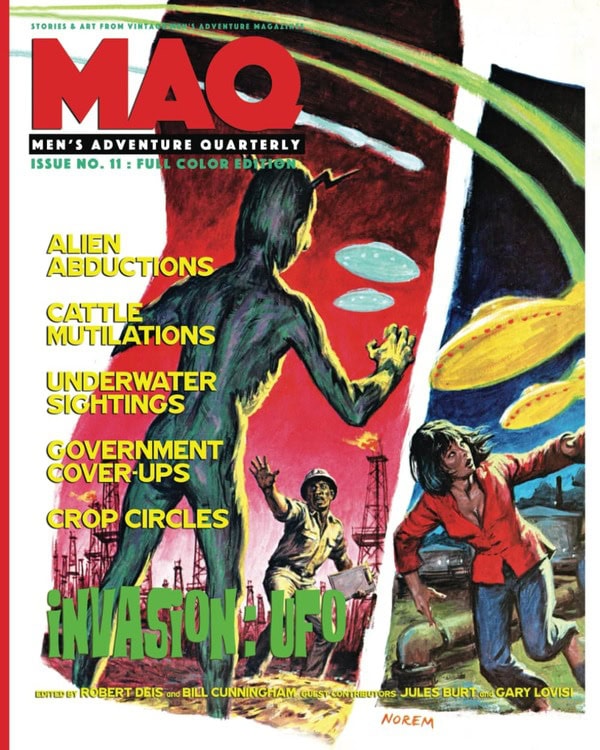
Some of those covers!